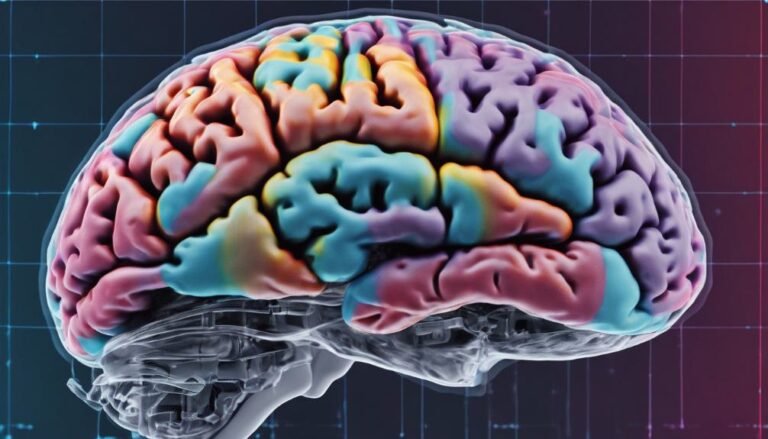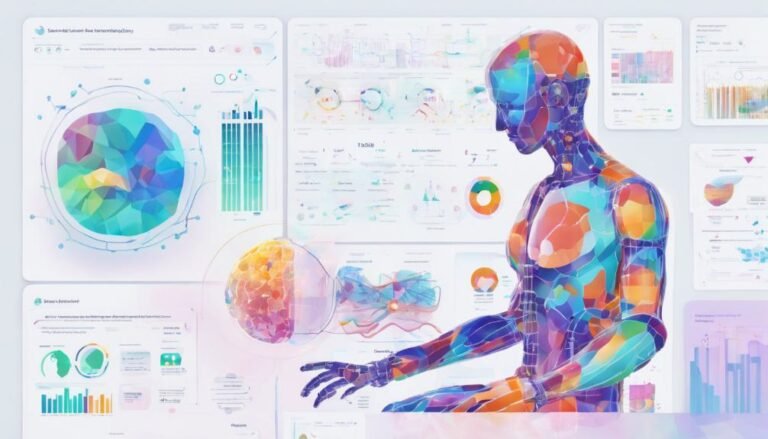AI in Translational Medicine
Did you know that AI in translational medicine is reshaping the landscape of healthcare by revolutionizing the way scientific discoveries are translated into clinical applications? Imagine a world where advanced algorithms can reveal disease progression, recommend personalized treatments, and optimize clinical trial processes to enhance patient outcomes. The integration of AI in healthcare holds the key to unleashing innovative solutions for personalized healthcare delivery and advancing precision medicine initiatives. Explore the transformative potential of AI in translational medicine and discover how it is paving the way for a future of tailored therapies and precision medicine applications.
Key Takeaways
- AI optimizes drug development by analyzing vast datasets.
- Personalized treatment plans are designed using AI insights.
- AI identifies biomarkers for tailored therapies.
- Revolutionizes clinical trials with AI-driven processes.
- Enhances precision medicine through AI integration.
The Role of AI in Healthcare
AI plays a pivotal role in revolutionizing healthcare by enhancing diagnostic accuracy and treatment outcomes. Through the utilization of advanced algorithms and machine learning techniques, AI greatly improves healthcare efficiency by streamlining processes and providing healthcare professionals with invaluable insights. By analyzing vast amounts of data at incredible speeds, AI can assist in diagnosing diseases more accurately and at an earlier stage, leading to better patient outcomes.
AI's ability to process and interpret medical images, such as X-rays and MRIs, with high precision enhances diagnostic accuracy and reduces the chance of human error. This not only saves valuable time in the diagnostic process but also ensures that patients receive appropriate treatment promptly.
Additionally, AI-powered predictive analytics can help healthcare providers identify patterns and trends in patient data, enabling personalized treatment plans and proactive interventions.
Accelerating Medical Advancements
To further accelerate medical advancements, leveraging AI technologies in translational medicine has shown promising results in enhancing research and development processes. Medical innovation is being propelled by the integration of AI, enabling researchers to analyze vast amounts of data quickly and accurately. Technology advancement in AI has revolutionized drug discovery by identifying potential candidates more efficiently, reducing time and costs traditionally associated with this process.
In the domain of medical innovation, AI plays a pivotal role in streamlining clinical trials. Through predictive modeling and data analysis, AI can optimize trial design, patient selection, and monitoring, ultimately leading to faster and more successful trials. The ability of AI to process complex biological data has also expedited the identification of biomarkers for various diseases, aiding in the development of targeted therapies.
Moreover, AI-driven technologies have facilitated the personalization of treatment plans by analyzing individual patient data to tailor interventions based on specific needs. This customization can lead to improved patient outcomes and a more efficient healthcare system overall.
The continuous evolution of AI in translational medicine is paving the way for revolutionary advancements in the medical field.
Disease Progression Prediction
Predicting disease progression is a critical aspect of translational medicine that requires advanced analytical tools and models. By leveraging machine learning and predictive analytics, healthcare innovation is paving the way for more accurate disease prognosis. These technologies analyze vast amounts of patient data to identify patterns and trends that can help forecast how a disease might evolve over time.
Machine learning algorithms are trained on diverse datasets encompassing patient demographics, genetic information, lifestyle factors, and medical history. Through this analysis, predictive models can anticipate the progression of various diseases, such as cancer, diabetes, or cardiovascular conditions. By incorporating real-time data and continuous monitoring, these models can adapt and refine their predictions, ultimately improving the accuracy of disease prognosis.
Healthcare professionals can utilize these predictive analytics tools to proactively intervene, personalize treatment plans, and provide patients with better care. By staying ahead of disease progression, medical practitioners can optimize interventions and allocate resources more effectively, ultimately enhancing patient outcomes and advancing the field of translational medicine.
Personalized Treatment Recommendations
You can now explore how AI enables tailored treatment plans by providing precision medicine insights.
AI algorithms analyze vast amounts of patient data to recommend personalized therapies based on individual characteristics and disease progression.
These recommendations can lead to more effective treatments and better patient outcomes.
Tailored Treatment Plans
Utilizing AI algorithms, tailored treatment plans in translational medicine are being developed to provide personalized recommendations based on individual patient data. These plans involve the customization of healthcare strategies to suit the unique characteristics and needs of each patient, leading to the delivery of individualized therapies and patient-specific interventions.
By leveraging advanced technologies, such as machine learning and data analytics, healthcare providers can analyze vast amounts of patient information to tailor treatment plans that optimize outcomes and minimize risks.
Tailored healthcare enabled by AI plays an essential role in the paradigm shift towards personalized medicine. Through a deep understanding of genetic, environmental, and lifestyle factors, AI algorithms can suggest treatment options that are most likely to benefit a specific individual. This approach not only enhances the efficacy of medical interventions but also reduces the likelihood of adverse reactions or ineffective treatments.
Ultimately, the integration of AI in developing tailored treatment plans represents a significant advancement in improving patient care and outcomes in translational medicine.
Precision Medicine Insights
AI algorithms in translational medicine provide precise insights for personalized treatment recommendations based on individual patient data. By analyzing biomarkers and utilizing patient stratification techniques, AI can identify specific characteristics that influence treatment responses. This tailored approach allows for the optimization of treatments through pharmacogenomics, ensuring that medications aren't only effective but also tailored to each patient's genetic makeup and other factors.
Through the integration of AI technologies, healthcare professionals can make informed decisions about the most suitable treatment options for each individual. By considering factors such as genetic variations, lifestyle choices, and environmental influences, AI assists in creating personalized treatment plans that are more likely to yield positive outcomes.
Data-Driven Decision Making
You can optimize clinical workflows by leveraging data-driven decision-making, ensuring efficient resource allocation and streamlined patient care processes.
By utilizing AI algorithms to analyze vast datasets, treatment outcomes can be improved through personalized approaches tailored to individual patient profiles.
This approach not only enhances patient care but also accelerates research progress by identifying patterns and insights that can guide future studies and innovations.
Enhancing Clinical Workflows
Enhancing clinical workflows through data-driven decision making optimizes operational efficiency and improves patient outcomes. Workflow optimization is pivotal in modern healthcare to streamline processes and guarantee timely delivery of care.
By integrating AI technology into clinical workflows, healthcare providers can enhance clinical efficiency and overall quality of care. AI integration allows for the automation of repetitive tasks, freeing up healthcare professionals to focus on patient care. Through the implementation of AI-driven systems, such as predictive analytics tools and machine learning algorithms, healthcare organizations can make data-driven decisions that lead to more accurate diagnoses and personalized treatment plans.
Technology implementation in clinical workflows also enables real-time monitoring of patient data, facilitating early intervention and reducing the risk of adverse events. By leveraging AI to analyze vast amounts of patient information, healthcare teams can identify trends, predict patient outcomes, and tailor interventions accordingly.
Improving Treatment Outcomes
Improving treatment outcomes through data-driven decision making involves leveraging advanced technologies to analyze patient data and optimize care strategies. Treatment optimization aims to tailor medical interventions to individual patients by utilizing outcomes analysis and predictive modeling techniques.
By incorporating patient engagement strategies, healthcare providers can enhance treatment adherence and effectiveness.
Utilizing predictive modeling, healthcare professionals can forecast how a patient may respond to different treatment options, enabling personalized care plans. This data-driven approach allows for the identification of best treatment pathways based on individual patient characteristics and historical outcomes.
Through continuous analysis of patient data, treatment outcomes can be monitored, and adjustments can be made in real-time to improve overall effectiveness.
Accelerating Research Progress
Accelerating research progress in translational medicine involves harnessing data-driven decision-making techniques to expedite the discovery and development of innovative healthcare solutions.
Research optimization through AI integration enables scientists to sift through vast amounts of data efficiently, identifying patterns and relationships that may have otherwise gone unnoticed. By leveraging AI algorithms, researchers can streamline the process of data analysis, prioritizing leads for further investigation based on predictive modeling and machine learning insights.
Rapid discovery is facilitated by technology advancements that allow for real-time data collection, analysis, and interpretation. Through the integration of AI tools, researchers can automate repetitive tasks, freeing up time for more complex analyses and experimentation.
This accelerated pace of research not only speeds up the development of new treatments but also enhances the quality and reliability of findings. By embracing data-driven decision-making processes, the field of translational medicine can harness the power of AI to drive impactful advancements in healthcare delivery and patient outcomes.
Precision Medicine Applications
Utilizing artificial intelligence (AI) in translational medicine has revolutionized the field by enabling the identification of individualized treatment strategies based on a patient's genetic makeup and specific biomarkers.
In precision medicine applications, AI plays an essential role in optimizing clinical trials through the efficient selection of participants. By analyzing vast datasets, AI can identify biomarkers that indicate disease susceptibility, progression, and response to treatment. This targeted approach enhances the success rates of clinical trials by ensuring that the right patients are included, leading to more accurate results and faster drug development.
Furthermore, AI aids in biomarker identification by sifting through complex genetic and molecular data to pinpoint the most relevant indicators for personalized treatment. By analyzing patterns and associations within large datasets, AI algorithms can identify subtle variations that may influence treatment outcomes.
This precise identification of biomarkers allows for the development of tailored therapies that target specific patient populations, ultimately improving treatment efficacy and patient outcomes.
Enhancing Patient Outcomes
Enhancing patient outcomes is a primary objective of incorporating artificial intelligence (AI) into translational medicine practices. Through robust patient engagement strategies and seamless technology integration, AI plays a pivotal role in revolutionizing healthcare delivery.
One significant way AI enhances patient outcomes is through remote monitoring. By leveraging AI-powered devices and sensors, healthcare providers can remotely track patients' health metrics in real-time, allowing for early intervention and personalized care adjustments. This proactive approach helps prevent complications and improves overall patient well-being.
Additionally, AI enables real-time feedback mechanisms that provide patients with immediate insights into their health status. By analyzing data continuously, AI algorithms can offer personalized recommendations and interventions based on individual health trends. This tailored feedback fosters patient empowerment and adherence to treatment plans, ultimately leading to better health outcomes.
AI in Drug Development
AI revolutionizes the process of drug development by streamlining data analysis and accelerating decision-making in pharmaceutical research. In drug discovery, machine learning plays a pivotal role by analyzing vast amounts of biological and chemical data to identify potential drug candidates efficiently.
By utilizing pharmacogenomics, AI algorithms can predict how individuals will respond to specific medications based on their genetic makeup, allowing for personalized treatment plans.
AI algorithms enable researchers to sift through massive datasets to uncover patterns that would be impossible to discern manually. This accelerates the identification of promising drug targets and speeds up the optimization of lead compounds.
Additionally, AI-driven simulations can predict the pharmacokinetics and pharmacodynamics of a drug candidate, providing valuable insights into its efficacy and safety profile.
Future Implications
The advancements in AI technology are poised to reshape the landscape of translational medicine in the coming years. As AI continues to evolve, it brings forth a wave of future implications that must be carefully considered. Ethical considerations are at the forefront of these implications, with questions arising around the use of AI in decision-making processes, patient care, and research. Ensuring that AI is used responsibly and ethically will be paramount in maintaining trust within the medical community and among patients.
Regulatory challenges also loom large on the horizon. Developing robust regulatory frameworks that can keep pace with the rapid advancements in AI technology will be essential. Striking a balance between fostering innovation and ensuring patient safety will require close collaboration between regulatory bodies, researchers, and industry stakeholders.
Privacy concerns and data security represent additional key areas of focus. Safeguarding patient data and ensuring the secure transmission and storage of sensitive information will be vital as AI becomes more deeply integrated into translational medicine practices. Addressing these challenges proactively will be imperative in harnessing the full potential of AI in advancing translational medicine while upholding ethical standards and regulatory compliance.
Conclusion
To sum up, AI in translational medicine is the key to revealing a future where healthcare is personalized, precise, and efficient. By leveraging the power of advanced technologies and data analysis, researchers are paving the way for groundbreaking medical advancements that will revolutionize patient care.
Imagine a world where treatments are tailored to individual needs, diseases are predicted before they manifest, and outcomes are optimized for each patient. The future of healthcare is here, driven by AI in translational medicine.







